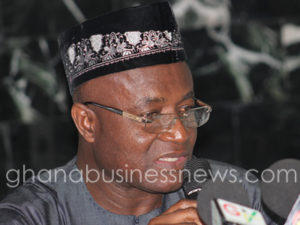Ghana Parliament says it will pass RTI Bill before end of session on December 22

Mr Osei Kyei-Mensah Bonsu, the Minister for Parliamentary Affairs, has given the assurance that Parliament would pass the Right to Information (RTI) Bill before the end of the session on Saturday, December 22.
“The Bill has suffered sequential abortions but like ‘Abiku’, it refuses to die. Parliament is resolved to pass the RTI Bill,” he said.
However, the Minister said, if the Bill was not passed before the end of the session, it would definitely do so in the first two weeks of the next session.
The RTI Bill has been in Parliament for the past 22 year but is currently still at the consideration stage.
Mr Kyei-Mensah Bonsu, who is also the Majority Leader, was speaking at a ‘Dialogue with Civil Society Organisations, programme on the theme: “Interrogating Parliament’s Contribution to the Consolidation of Ghana’s Democracy thus far: The Perspective of CSO.”
The Ministry of Parliamentary Affairs as part of its mission to deepen inclusiveness in a participatory democracy recognised the importance of Civil Society in the democratic process, especially in providing a vital link between citizens and the State.
The Dialogue is being organised with the view to examine the performance of Ghana’s Parliament, since 1993 in order to identify the strengths and weakness and provide a way forward into the next twenty-five years of Ghana’s democratic journey.
He said now that the 2019 budget and economic policy of government and subsequently, the consideration of the estimates of the various arms, organs and bodies of governance as well as the Metropolitan, Municipal and District Assemblies are done, there was scant space for other businesses.
He said the Mandate of the Ministry was to interface the Executive and the Legislature on all fronts and to employ “soft power” by engendering consensus and inclusiveness with all State and Non-State actors.
The Majority Leader said a robust Civil Society was necessary for the country’s democracy to thrive, adding that “the fact remains that CSOs activism is most relevant in an environment of a comparatively weak Parliament.”
He said in many jurisdictions in the developing world, governance or political authority is heavily tilted in favour of the Executive and Parliament is emasculated.
Mr Kyei-Mensah Bonsu said civil society activism is required to balance the scale of rational power to protect the interest of the public.
“I strongly urge you all not to relent at this important stage of nationhood,” he said.
He said CSOs by partnering with government and other stakeholder could affect the nation’s consciousness and contribute to the quick evolution of the country’s democracy with far reaching impact on the fortunes of the country.
Dr Evans Aggrey-Darkoh, the Acting Chief Director of the Ministry for Parliamentary Affairs, said the Ministry has an important vision to promote consensus among the citizenry to enhance participatory and representative democracy.
He said a strong Parliament is critical to the consolidation of Ghana’s democracy and the stability and persistence of democracy and democratic principles ought to be concern of all.
“Democracy must enjoy legitimacy to the extent that both the elite and the masses believe that the democratic rule was the most appropriate system of rule,” he added.
He said in making democracy the only game in town attitudinally, behaviourally and constitutionally, no effort should be spared in making institutions of State including Parliament strong.
He said a strong Parliament is not only the one that makes laws but also resilient enough to check the overweening, overbearing and sometimes unlawful tendencies of the Executives.
Source: GNA
